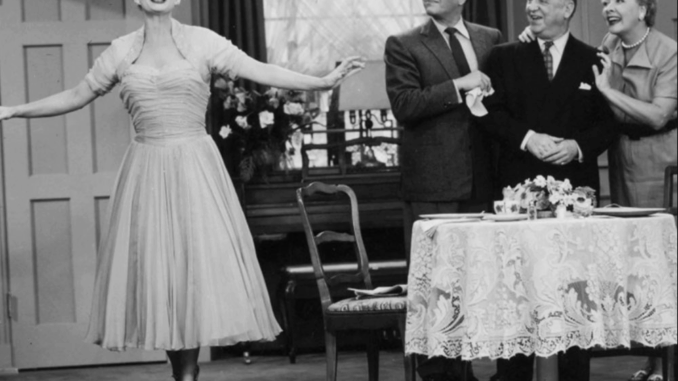
The Shocking Diagnosis That Almost Ended a Dynasty
The story of “I Love Lucy” is one of television’s greatest triumphs, a testament to the undeniable chemistry of Lucille Ball and Desi Arnaz. Their on-screen partnership as Lucy and Ricky Ricardo captivated millions, but behind the scenes, their lives were often as dramatic as their sitcom plots. While the world remembers them for their comedic genius, a dark and almost career-ending secret loomed over Desi Arnaz, one that began with a terrible medical mistake: a shocking syphilis diagnosis. This harrowing experience, though later proven false, reveals the fragility of celebrity and the immense personal toll of an inaccurate health scare.
The Man Behind Ricky Ricardo
Desi Arnaz was more than just a talented actor and musician; he was a shrewd businessman and a television pioneer. Born Desiderio Alberto Arnaz y de Acha III in Santiago, Cuba, he came from a wealthy and politically influential family. The Cuban Revolution of 1933 forced his family to flee to Miami, where they arrived with almost nothing. Desi’s charm, musical talent, and relentless drive propelled him from playing in a small rhumba band to becoming a celebrated Broadway star. His success led to a film contract and, eventually, his famous meeting with Lucille Ball on the set of the 1940 film “Too Many Girls.”
Their whirlwind romance and marriage were the stuff of Hollywood legend. Despite their deep love, their relationship was often turbulent, with Desi’s philandering and alcohol use causing frequent strain. However, their professional collaboration on “I Love Lucy” would become their most enduring legacy. It was Desi’s revolutionary idea to film the show on 35mm film with a three-camera setup, an innovation that not only preserved the show for syndication but also set the standard for sitcom production for decades to come.
The Fateful Doctor’s Visit
In the early years of their marriage, before “I Love Lucy” became a household name, Desi Arnaz faced a personal crisis. His health was a concern, and during a routine physical examination, a doctor delivered a devastating blow. The diagnosis was syphilis, a sexually transmitted disease that, at the time, carried an immense social stigma and was widely feared for its severe, long-term health consequences. The news was a hammer blow to Desi and, by extension, to his wife, Lucille Ball.
The stigma of syphilis in the mid-20th century was profound. A diagnosis could ruin a person’s reputation, end a career, and destroy relationships. For Desi, an entertainer whose public image was everything, this news was catastrophic. The diagnosis cast a dark shadow over his life, fueling his anxiety and contributing to the self-destructive behaviors that strained his marriage. Lucille Ball was heartbroken and terrified, not only for her husband’s health but also for the potential fallout on their lives and careers. The stress of the situation was immense, and the couple struggled to cope with the weight of this secret.
The Terrible Mistake
Thankfully, the story did not end in tragedy. Driven by a need for a second opinion and a hope that the diagnosis was wrong, Desi consulted with his friend, the renowned Hollywood doctor George H. Field. Dr. Field was known for his discretion and expertise, and he meticulously reviewed the findings. What he discovered was a colossal and almost unbelievable error.
The original doctor had confused Desi Arnaz’s medical records with those of another patient—a man named Desiderio Albert Arnaz. The first name was a common one, and the two men had similar-sounding names. The “Albert” had been misread as “Alberto,” and the “Arnaze” as “Arnaz,” leading to the devastating mix-up. The original diagnosis was a case of mistaken identity, a clerical error with a life-altering impact. Desi Arnaz did not have syphilis. The relief was immeasurable, and the weight of the diagnosis was finally lifted.
The incident highlights the shocking reality of medical mistakes and the profound consequences they can have. For Desi, it was a a terrifying journey through fear, shame, and despair, all for naught. The experience, though brief, left a lasting mark on him and his relationship with Lucille. It was a reminder of how fragile their lives were, and how quickly a single error could dismantle everything they had worked so hard to build.
A Legacy Beyond the Laughter
The story of Desi Arnaz’s syphilis scare is a powerful, yet often overlooked, part of the “I Love Lucy” legacy. It’s a story of vulnerability and resilience, a stark contrast to the perfect, scripted world of the Ricardo household. While the show presented a cheerful and idealized version of married life, the real lives of Lucille and Desi were far more complex and challenging.
This specific incident served as a wake-up call, emphasizing the need for discretion and due diligence in medical care. It also underscored the immense pressure that public figures like Desi Arnaz faced, where even a false rumor could destroy a career. The relief of the correct diagnosis allowed them to move forward, to create a show that would redefine television and build an empire with Desilu Productions.
Ultimately, the syphilis scare is just one piece of the fascinating and often tumultuous puzzle that was the life of Desi Arnaz. His journey from a Cuban exile to a television mogul, fraught with personal demons and professional triumphs, is a testament to the complexity of the man behind the music and the jokes. The show’s enduring popularity is a tribute to his and Lucille’s genius, but their real-life story—with all its pain, joy, and near-catastrophes—is perhaps even more compelling. The terrible mistake that almost destroyed Desi Arnaz is a reminder that even the biggest stars are just as human, and just as vulnerable, as the rest of us.